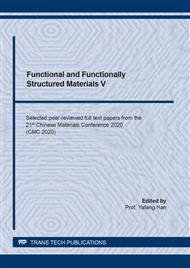p.318
p.328
p.337
p.344
p.350
p.358
p.368
p.377
p.388
Effect of the Service Temperature on the Strength Plasticity and Fracture Mechanism of Cr-Mo Casing Steel
Abstract:
In recent years, the oil and gas well casing is confronted with more complex service environment, and the casing is subjected to higher service load and temperature. In this study, the strength and plasticity of Cr - Mo low alloy casing steel of 80, 90 and 110 steel grades commonly used under high temperature service conditions was studied. The results show that with the increase of temperature, the yield strength and tensile strength of casing steel decreased. The sensitivity of high steel grade to temperature change was higher than that of lower steel grade; with the increase of steel grade, the fracture mechanism of casing steel changed from microporous polymerization fracture induced by large size second phase particles to shear propagation fracture induced by sub grain boundary microporous polymerization. This study has important guiding significance for the service safety and strain design of high grade steel under high temperature conditions.
Info:
Periodical:
Pages:
350-357
DOI:
Citation:
Online since:
June 2021
Authors:
Keywords:
Price:
Сopyright:
© 2021 Trans Tech Publications Ltd. All Rights Reserved
Share:
Citation:


